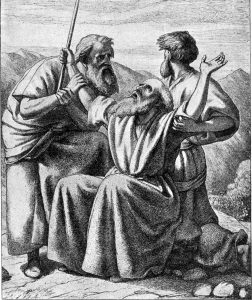 Exodus is a continuity of God’s promises to Abraham, Isaac, and Jacob in Genesis. Through Moses, God continues to fulfill His promises to His chosen people, the sons of Israel.
Exodus is a continuity of God’s promises to Abraham, Isaac, and Jacob in Genesis. Through Moses, God continues to fulfill His promises to His chosen people, the sons of Israel.
The 430 years of slavery for the people of Israel in Egypt (Ex 12:40), correspond to God’s words to Abraham that his descendants would be slaves in a land that was not theirs and oppressed for 400 years (Gen 15:13). “God chose Abraham and made a covenant with him and his descendants. By the covenant, God formed his people and revealed his law to them through Moses” (CCC 72).
As in previous chapters, the LORD was eager for his chosen people, the sons of Israel, to have full trust and faith in Him. The LORD answered the cries of hundreds of thousands of Israelites by rescuing them from the slavery in Egypt, but He did not immediately give the Promised Land to them. Moses led his people in the wilderness for more than 40 years, where they were suspecting, dissatisfied, quarreling, questioning, even rebellious. God showed them miracles over and over again — bitter water made sweet (Ex 15:25), manna from heaven (Ex 16:4), defeating the Amalek (Ex 17:13) — in the hope that they would “recognize him and serve him as the one living and true God, the provident Father” (CCC 62).
Israelites being the chosen race, with whom God established the covenant, were being gradually instructed by God Himself through these different trials so they “might acknowledge him and serve him in holiness” (CCC 781). God’s salvation for the Israelites was not only to deliver them “out of the house of bondage” (Deut 5:6) but also from their sins. The crossing of the Red Sea represented the liberation wrought by Baptism (CCC 1221), hence, the Israelites became “more and more aware of the universality of sin, will no longer be able to seek salvation except by invoking the name of the Redeemer God” (CCC 431).
